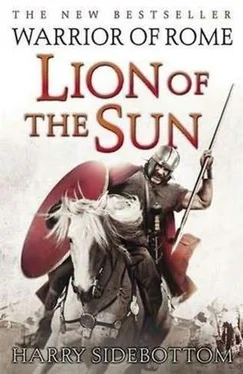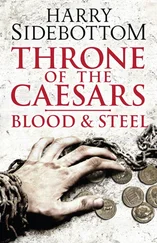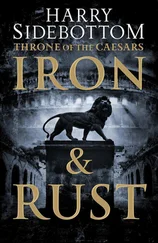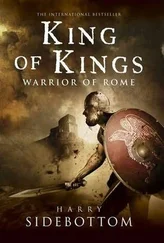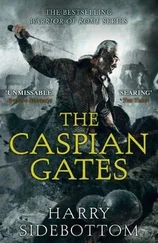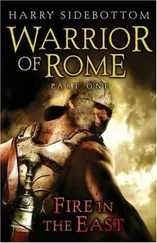Harry Sidebottom - Lion of the Sun
Здесь есть возможность читать онлайн «Harry Sidebottom - Lion of the Sun» весь текст электронной книги совершенно бесплатно (целиком полную версию без сокращений). В некоторых случаях можно слушать аудио, скачать через торрент в формате fb2 и присутствует краткое содержание. Жанр: Исторические приключения, на английском языке. Описание произведения, (предисловие) а так же отзывы посетителей доступны на портале библиотеки ЛибКат.
- Название:Lion of the Sun
- Автор:
- Жанр:
- Год:неизвестен
- ISBN:нет данных
- Рейтинг книги:5 / 5. Голосов: 1
-
Избранное:Добавить в избранное
- Отзывы:
-
Ваша оценка:
- 100
- 1
- 2
- 3
- 4
- 5
Lion of the Sun: краткое содержание, описание и аннотация
Предлагаем к чтению аннотацию, описание, краткое содержание или предисловие (зависит от того, что написал сам автор книги «Lion of the Sun»). Если вы не нашли необходимую информацию о книге — напишите в комментариях, мы постараемся отыскать её.
Lion of the Sun — читать онлайн бесплатно полную книгу (весь текст) целиком
Ниже представлен текст книги, разбитый по страницам. Система сохранения места последней прочитанной страницы, позволяет с удобством читать онлайн бесплатно книгу «Lion of the Sun», без необходимости каждый раз заново искать на чём Вы остановились. Поставьте закладку, и сможете в любой момент перейти на страницу, на которой закончили чтение.
Интервал:
Закладка:
Harry Sidebottom
Lion of the Sun
Prologue
Mesopotamia, North of the City of Carrhae, Spring AD 260
The emperor blinked as he stepped out into the bright sunshine. He seemed to wince as the court official called out his full title in Latin. 'Imperator Caesar Publius Licinius Valerianus Augustus, Pius Felix, Pater Patriae, Germanicus Maximus, Invictus, Restitutor Orbis'. At a sign, a horse was led forward. Its bridle shone with silver and gold, and its trappings were imperial purple. Needing no prompting, the elderly emperor walked to where the horse waited. As so many times before in the last few days, he got down on one knee, then the other. With a momentary pause, which might be excused in someone his age, he got down on all fours, his elbows in the dust. What seemed an age passed. The horse shifted and exhaled through its lips, the noise loud in the quiet camp. The sun was hot on the emperor's back.
The sound of another man walking towards the horse broke the near-silence. Out of the corner of his eye, the emperor could see two purple boots. Deliberately, the left one was raised and placed on his neck. As many times before, its owner let some of his weight come down through the boot before he spoke.
'This is the truth, not what the Romans depict in their sculptures and paintings,' he declared, then swung himself into the saddle, his weight hard upon his imperial mounting block. 'I am the Mazda-worshipping divine Shapur, King of Kings of Aryans and non-Aryans, of the race of the gods, son of the Mazda-worshipping divine Ardashir, King of Kings of the Aryans, of the race of the gods, grandson of the King Papak, of the house of Sasan; I am the lord of the Aryan nation. You mighty, look on my works and tremble.'
Ballista, the Roman general from beyond the borders in the far north, lay full length in the dust and watched. His reluctant proskynesis, or posture of adoration, was enforced by guards and the threat of a beating or worse and echoed by the rest of the Roman high command. Successianus the Praetorian Prefect, Cledonius the ab Admissionibus, Camillus the commander of Legio VI Gallicana — everyone of importance who had been with the field army — they were all there. The world had been turned upside down, the whole cosmos was shaken. For the first time, a Roman emperor had been captured by the barbarians. Ballista could feel the outrage and horror of his commilitiones as they were forced to witness the humiliation of Valerian — the pious, lucky, invincible emperor of the Romans, the restorer of the world — on his knees and dressed as a slave.
Four days earlier, Valerian had been captured. He had been betrayed by the companion he most trusted, the Comes Sacrarum Largitionum Macrianus the Lame. The Count of the Sacred Largess had arranged everything. His younger son, Quietus, had led the aged emperor and his army into a trap and then abandoned them.
Ballista, belly to the ground, furious in his abasement, thought of the repulsive youth Quietus, by now safely back in the Roman city of Samosata, and he repeated to himself a vow he had made twice before: One day, maybe not soon, but one day, I will kill you.
Shapur caracoled his mount, its hooves plunging and stamping dangerously close to the elderly man on the ground. Then the Sassanid King of Kings paced his horse along the line of his own courtiers, noblemen and priests and rode away, laughing.
Slowly, heavily, Valerian began to get to his feet. The butts of spears, freely wielded, encouraged the Comites Augusti to do the same.
As he hauled himself up, Ballista looked at the Sassanid courtiers. There, prominent among the priests, was the Persian youth whom Ballista had known as Bagoas when the boy had been his slave. How the wheel of fortune turns. Was the youth smiling at him behind that black beard?
The sight of Bagoas turned Ballista's thoughts to his familia. Had his ex-slaves Calgacus, Maximus and Demetrius made it to safety? Were they now also safe in Samosata? Or were they already on the road to Antioch? Antioch, where Ballista's two young sons and wife waited, all unaware. The pain of thinking of them was almost unbearable. Ballista spoke in his heart to the high god of his northern youth: Allfather, Death-blinder, Deep Hood, Fulfiller of Desire, Woden-born as I am, hear my prayer: I will give whatever is necessary, do whatever it takes, but let me return to them — return to them whatever the cost.
PART ONE
Captivus (The East, Spring-Summer AD260)
'What is it like to lose one's native land? Is it a grievous loss?'
Euripides, Phoenissae, 387-8Maximus lay motionless watching the Persians. They were in front of and below him, towards the middle of the small upland meadow where three paths came together. They were not above forty paces away. He could see them clearly: in the pale moonlight, men and horses were solid, dark-grey silhouettes. There were twenty-one Sassanid cavalrymen. Maximus had counted them several times.
The Sassanids were confident. They had dismounted and were talking quietly. They were unavoidably in the way. Maximus raised his eyes to check the position of the sickle-shaped, three-night-old moon. There was not much of the night left. With northern Mesopotamia overrun with Persian patrols, Maximus and the others had to be safe behind the walls of Zeugma by dawn. There was no time to retrace their steps or to cast about for another path which ran east-west through the high country. If the Persians did not move on within half an hour, the Romans would have to try and fight their way through. It did not promise well. They were outnumbered three to one. Demetrius had never been much of a one in a fight, and old Calgacus was wounded. Sure, but it did not promise well at all.
Moving slowly, hardly moving his head a fraction, Maximus looked over at Calgacus. The old Caledonian was lying on his left side, favouring his bandaged right arm. His great domed, balding skull blended well with the white rocks. Maximus was fond of Calgacus. They had been together a long time — nineteen years, since Maximus had been bought in as a slave bodyguard to the familia of Ballista. Of course, Calgacus had been with Ballista since the latter's childhood among the Angles of Germania. Calgacus was a sound man. Maximus was fond of him, although not as fond as he would be of a good hunting dog.
Maximus studied his companion, the dark lines of his wrinkled forehead and the black pools of his sunken cheeks. Truth be told, Maximus was worried. Sure, Calgacus was tough. But he had seemed old nearly twenty years before. Now he was wounded, and the last four days must have taken it out of the old bastard.
Four days earlier, they had watched Ballista ride out from the trapped army, one of the five comites accompanying the emperor Valerian to his ill-fated meeting with the Sassanid King of Kings Shapur. They had done what their patronus Ballista had commanded. As the imperial party rode west, they had crossed the perimeter to the south and doubled back behind the eastern slope of the hill. The small group of horsemen — Maximus, Calgacus and Demetrius, Ballista's Greek secretary, along with eight Dalmatian troopers — had made no great distance north when they were challenged by a Sassanid picket. Maximus, the only one who could speak Persian, had shouted out the password, which Ballista had discovered from Quietus, the traitor who had led the Roman army into the trap: Peroz-Shapur.
The Sassanids were suspicious. They had been told to let through only one party of Roman horsemen heading north and shouting, 'The victory of Shapur', and one had already passed. Yet they drew back, their dark eyes scowling, their hands on their weapons.
Maximus and the others had ridden on. Not too fast, so as not to look as if they were fleeing; not too slowly as to appear to be flaunting themselves. Against every instinct for self-preservation, they kept to a gentle canter.
Читать дальшеИнтервал:
Закладка:
Похожие книги на «Lion of the Sun»
Представляем Вашему вниманию похожие книги на «Lion of the Sun» списком для выбора. Мы отобрали схожую по названию и смыслу литературу в надежде предоставить читателям больше вариантов отыскать новые, интересные, ещё непрочитанные произведения.
Обсуждение, отзывы о книге «Lion of the Sun» и просто собственные мнения читателей. Оставьте ваши комментарии, напишите, что Вы думаете о произведении, его смысле или главных героях. Укажите что конкретно понравилось, а что нет, и почему Вы так считаете.
